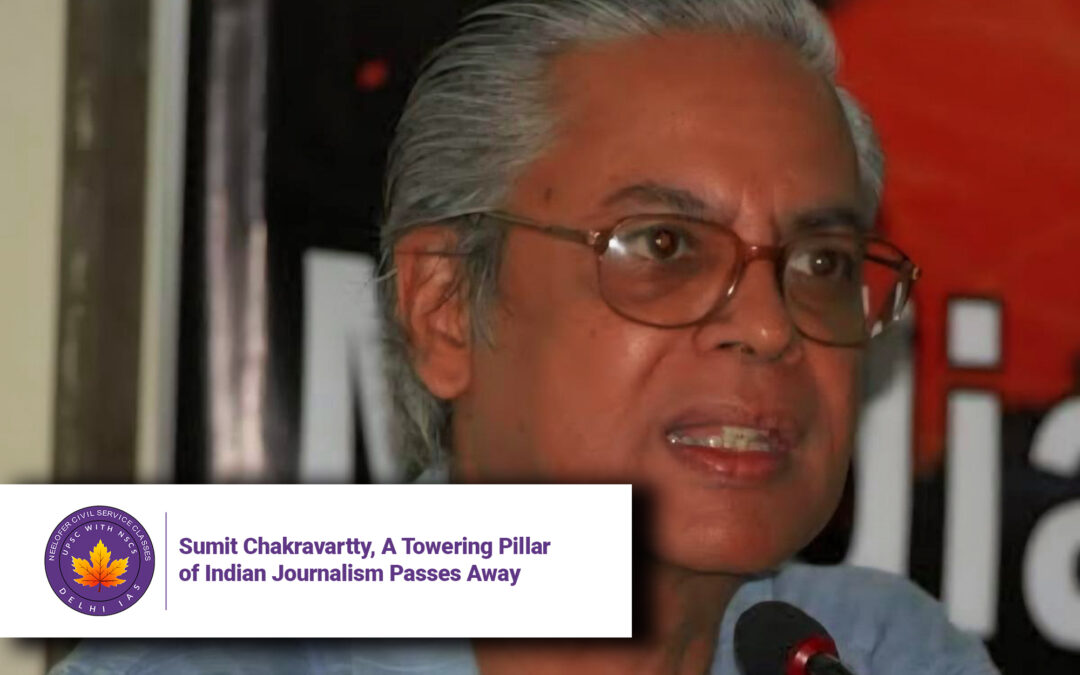Sumit Chakravartty, A Towering Pillar of Indian Journalism Passes Away
Why in News?
Sumit Chakravartty, a revered journalist and long-time editor of Mainstream Weekly, passed away on July 26 in Kolkata at the age of 79. Known for his fierce editorial independence, commitment to democratic values, and unmatched generosity, Chakravartty left behind a legacy that shaped and upheld journalistic integrity in India for decades.
Introduction
In an era when journalism increasingly walks a tightrope between commercial interests and public responsibility, few stood as firmly and fearlessly as Sumit Chakravartty. His passing marks the end of an epoch—one anchored in values of courage, conviction, and unwavering moral clarity. As editor of Mainstream Weekly, a publication that served as the voice of dissent and democratic discourse, Chakravartty’s role transcended journalism. He became a conscience-keeper, a mentor, and a moral compass for countless journalists, civil society members, and political thinkers.
Early Life and Legacy
Born into a politically engaged and intellectually vibrant family, Sumit Chakravartty had the unenviable task of living up to the legacy of his parents. His mother, Renu Chakravartty, was a formidable trade unionist, Lok Sabha MP (elected three times), and niece of Dr. B.C. Roy, the first Chief Minister of West Bengal. Inspired by her upbringing and political convictions, Renu encouraged her son’s engagement with public discourse and social justice.
Sumit’s father, Nikhil Chakravartty, was the founder of Mainstream Weekly in 1962. Over the years, the magazine became a platform for critical engagement and progressive thought. The senior Chakravartty was a champion of the free press and refused prestigious honors like the Padma Bhushan, famously stating that “journalists should not be identified with the establishment.”
It was into this crucible of expectation, idealism, and public scrutiny that Sumit Chakravartty was born and raised—a challenge he embraced with courage and humility.
Journalistic Journey and Integrity
Before joining Mainstream, Sumit worked internationally, including as Patriot’s Moscow correspondent and with The Daily in the UK. He brought home both global insight and a deep understanding of grassroots activism. When he took over the editorial reins at Mainstream, he fused these experiences into a unique editorial voice—combining rigorous journalism with activism.
Sumit Chakravartty’s journalism was driven by secularism, democratic ethics, and Gandhian ideals like antyodaya—uplifting the poorest and most marginalized. From grassroots struggles in Singur to Bhima Koregaon, his coverage went beyond headlines to explore systemic injustices. His editorial policy embraced pluralism, publishing diverse opinions even when they diverged from his personal beliefs.
Defending Press Freedom
Throughout his career, Chakravartty maintained a principled stand for press freedom. During critical junctures like the Emergency (1975–77) and the Defamation Bill of 1989, he took the lead in defending journalistic autonomy. While many cowered or compromised, he stood firm, echoing the spirit of his father.
In 2004, Chakravartty demonstrated remarkable editorial integrity by publishing an article critical of a powerful political figure’s sudden ideological shift. The decision drew personal attacks and threatened important relationships, but Sumit defended the writer without flinching. His loyalty was to the truth—not convenience or power.
Humanitarian Spirit and Generosity
Beyond the newsroom, Chakravartty was a man of deep empathy. A notable example dates back to 2008, when a colleague faced financial strain while producing a documentary. Sumit invited him to Lodhi Garden, pulled out his chequebook, and wrote a cheque of ₹2 lakh—refusing repayment. “I know the problem you are facing; give it back when you can,” he said. His generosity was not performative but quietly profound.
Activism and Civil Society Work
Chakravartty was not only a journalist but a committed activist. In 1992, he co-founded the Working Group on Alternative Strategies (WGRAS), a civil society initiative to explore development models rooted in equity and sustainability. He was the convener and a driving force behind its initiatives.
Following the Babri Masjid demolition, WGRAS launched a citizens’ march on January 26, 1993, demanding communal harmony. Despite initial delays and a lack of governmental response, the march was successfully held, culminating in a gathering at Amar Jawan Jyoti, India Gate. It became a symbol of unity, showing how civil society could step in when formal institutions falter.
Legacy at Mainstream Weekly
From 1962 to 2020, Chakravartty remained deeply involved in Mainstream’s evolution—from print to its digital rebirth. The Archives of Contemporary India at Ashoka University now house decades of the publication’s issues, serving as a testament to its role in shaping national discourse.
Sumit’s editorial vision transformed Mainstream into more than a magazine. It became a journal of ideas, a safe space for dissent, and a repository of alternative visions for the country. In an age of polarization, Mainstream remained independent, rational, and constructive—thanks to Sumit’s stewardship.
Conclusion
Sumit Chakravartty’s life was an embodiment of journalistic virtue. He blended integrity with compassion, intellect with humility, and activism with professionalism. He never sought the limelight but illuminated the paths of others—be they colleagues, readers, or activists.
As Indian journalism faces an existential crisis, Sumit’s legacy stands as both a beacon and a benchmark. His passing may have silenced a voice, but his ideas, values, and writings will continue to guide generations.
The story of Sumit Chakravartty is not just one of editorial excellence—it is the story of a life well-lived, in service of truth and society.
Q&A Section
1. Who was Sumit Chakravartty and why is he significant in Indian journalism?
Sumit Chakravartty was the editor of Mainstream Weekly, a respected political and current affairs journal. He played a vital role in defending press freedom in India and provided a platform for diverse, dissenting voices. His editorial leadership was grounded in secularism, democracy, and ethical journalism.
2. What is Mainstream Weekly and how did Chakravartty influence it?
Founded in 1962 by Nikhil Chakravartty, Mainstream Weekly became a hub for progressive intellectual thought. Under Sumit’s editorship, the journal upheld its commitment to pluralism, editorial independence, and constructive debate. He ensured its survival through both print and digital transformations.
3. What role did Sumit Chakravartty play in civil society activism?
In 1992, he co-founded the Working Group on Alternative Strategies (WGRAS), a civil society platform to promote equitable development policies. He organized a citizens’ march in 1993 following communal unrest and remained active in numerous movements addressing secularism, justice, and sustainability.
4. Can you provide an example of Sumit’s personal ethics and generosity?
In 2008, during a colleague’s financial crisis, Chakravartty offered a no-strings-attached loan of ₹2 lakh, showing his characteristic empathy. He prioritized people’s well-being over formality, a trait that earned him immense respect and affection.
5. What does Sumit Chakravartty’s legacy mean for the future of journalism?
Chakravartty’s legacy serves as a moral benchmark for journalists. At a time when the profession faces commercial and political pressures, his unwavering ethics, generosity, and commitment to truth stand as a powerful reminder of journalism’s higher calling.



